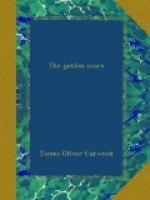CHAPTER VI
An hour later Philip looked at his watch. It was close to midnight. In that hour his nerves had been keyed to a tension that was almost at the breaking point. Not a sound came from off the Barren or from out of the scrub timber that did not hold a mental and physical shock for him. He believed that Bram and his pack would come up quietly; that he would not hear the man’s footsteps or the soft pads of his beasts until they were very near. Twice a great snow owl fluttered over his head. A third time it pounced down upon a white hare back in the shrub, and for an instant Philip thought the time had come. The little white foxes, curious as children, startled him most. Half a dozen times they sent through him the sharp thrill of anticipation, and twice they made him climb his tree.
After that hour the reaction came, and with the steadying of his nerves and the quieter pulse of his blood Philip began to ask himself if he was going to escape the ordeal which a short time before he had accepted as a certainty. Was it possible that his shots had frightened Bram? He could not believe that. Cowardice was the last thing he would associate with the strange man he had seen in the starlight. Vividly he saw Bram’s face again. And now, after the almost unbearable strain he had been under, a mysterious something that had been in that face impinged itself upon him above all other things. Wild and savage as the face had been, he had seen in it the unutterable pathos of a creature without hope. In that moment, even as caution held him listening for the approach of danger, he no longer felt the quickening thrill of man on the hunt for man. He could not have explained the change in himself—the swift reaction of thought and emotion that filled him with a mastering sympathy for Bram Johnson.
He waited, and less and less grew his fear of the wolves. Even more clearly he saw Bram as the time passed; the hunted look in the man’s eyes, even as he hunted—the loneliness of him as he had stood listening for a sound from the only friends he had—the padded beasts ahead. In spite of Bram’s shrieking cry to his pack, and the strangeness of the laugh that had floated back out of the white night after the shots, Philip was convinced that he was not mad. He had heard of men whom loneliness had killed. He had known one—Pelletier, up at Point Fullerton, on the Arctic. He could repeat by heart the diary Pelletier had left scribbled on his cabin door. It was worse than madness. To Pelletier death had come at last as a friend. And Bram had been like that—dead to human comradeship for years. And yet—




